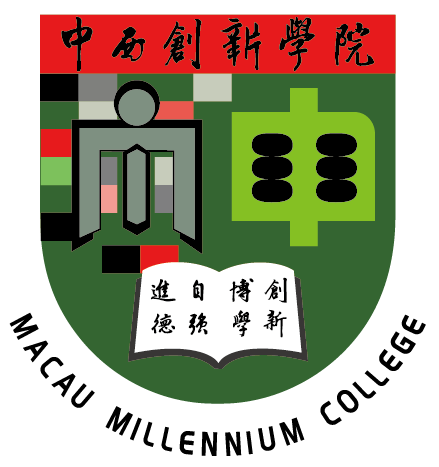Inauguration Ceremony of Macao International Language Service Society and Development Forum on Digital and Intelligent Language Service Programmes Successfully Held at Macau Millennium College
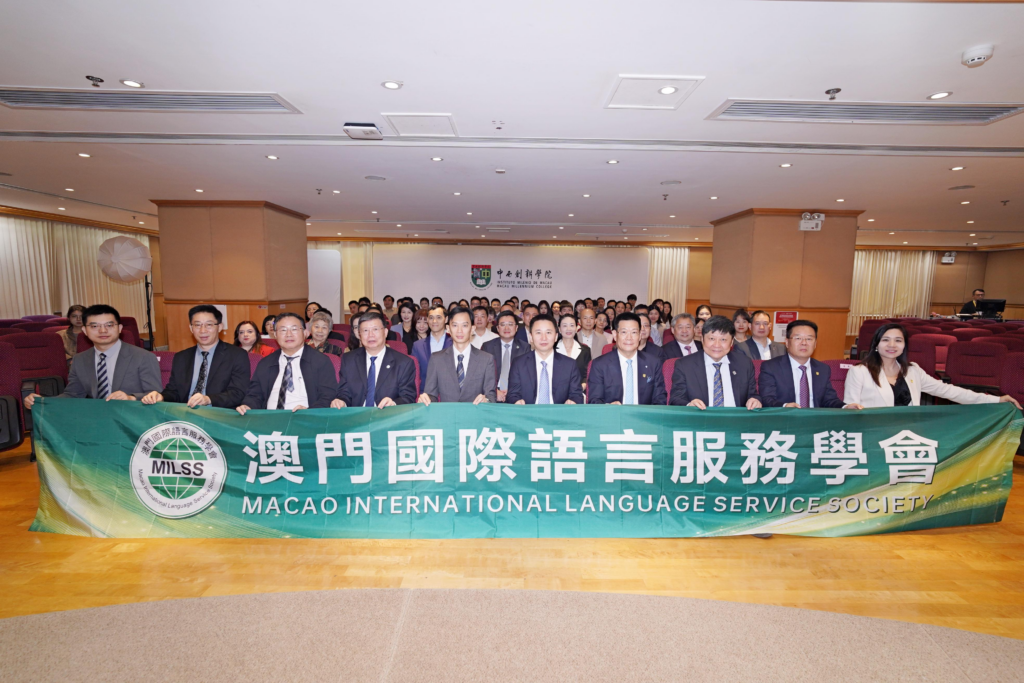
The event began with the 1st General Assembly of Macao International Language Service Society (the “Society”). The Assembly was chaired by Professor Zhong Weihe, Founder and President of the Society. All members voted to approve the list of the 1st Presidium and the Boards of Directors and Supervisors of the first General Assembly, marking the official entry of the Society into a new phase of institutionalised and professional operation.
The inauguration ceremony, held later, opened with the solemn playing of the national anthem and was hosted by Huang Hua, Assistant Rector of Macau Millennium College (“MMC”). Wang Lifei, Chair of the Board of Directors of the Society and Distinguished Professor at MMC, read out the list of Presidium members and Boards of Directors and Supervisors.
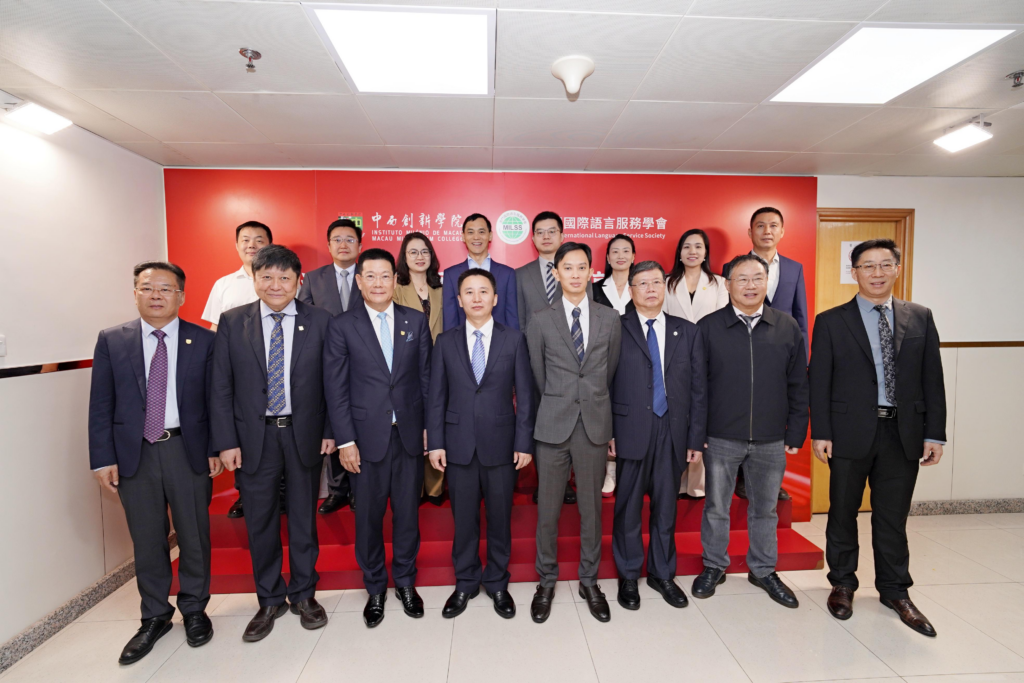
Li Yongxian, Deputy Minister of the Education and Youth Affairs Department of the Liaison Office of the Central People’s Government (LOCPG), presented the Letter of Appointment to President Zhong Weihe. President Zhong Weihe then presented Letters of Appointment to Honourary Presidents Huang Guowen, Zhang Hongming, and Xu Jie, and Vice Presidents Zhang Yunfeng and Zhu Xianchao, Chair Wang Lifei of the Board of Directors, Vice Chair Li Li of the Board of Directors, Board Members Gao Ming and Tian Liang, Chair Li Defeng of the Board of Supervisors, and Deputy Chair Chen Yujie of the Board of Supervisors.
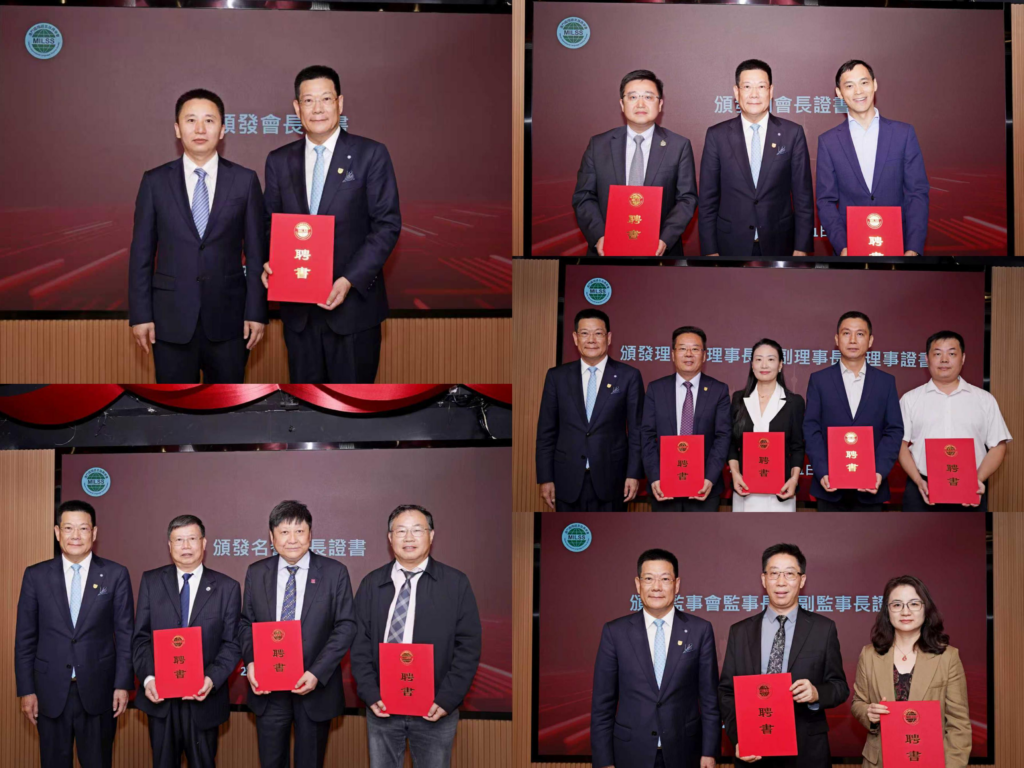
At the oath-taking ceremony, Li Yongxian, Deputy Minister of the Education and Youth Affairs Department of LOCPG, and Carlos Roberto Xavier, Head of the Department of Tertiary Education of the Education and Youth Development Bureau of the Macao SAR Government, served as witnesses. The newly appointed representatives of the Boards of Directors and Supervisors solemnly pledged their commitment to contributing to the development of Macao’s language services.
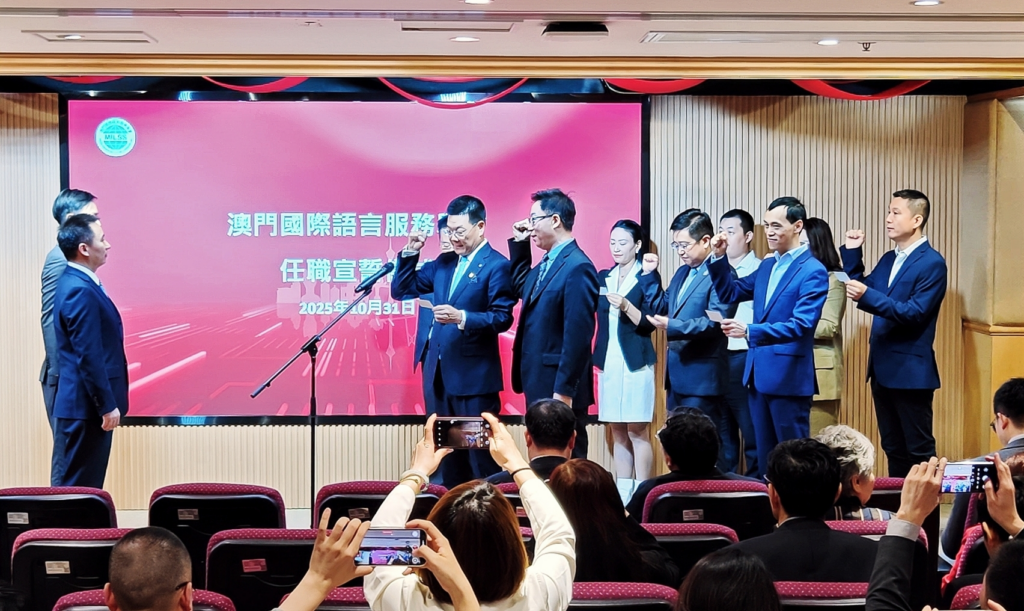
Zhong Weihe, Founder and President of the Society, stated in his inaugural speech that the establishment of the Society responds to new opportunities in industry development, new directions in discipline development, new integrations of technological progress, and the new demands of Macao’s development. The value of language services is growing rapidly, with the market expanding continuously. Language services are transforming from soft power into a new driving force for economic development. As artificial intelligence (AI), big data, and cloud computing technologies reshape the production methods of language services and unleash enormous potential, the language service discipline has come into being. The language service discipline is not a replacement for translation studies, but rather an upgrade and extension of it, blending technology, culture, and industry into a new ecosystem. As a bridge between China and Portuguese-speaking countries, Macao urgently needs a professional and international platform to integrate resources, connect demands, and lead the industry. The Society aims to become a bridge connecting Macao with the Guangdong-Hong Kong-Macao Greater Bay Area (the “Greater Bay Area”) and China with the world, driving technological innovation and industry standards, and serving as a link to gather talent and serve society, contributing to Macao’s prosperity and the implementation of national strategies.
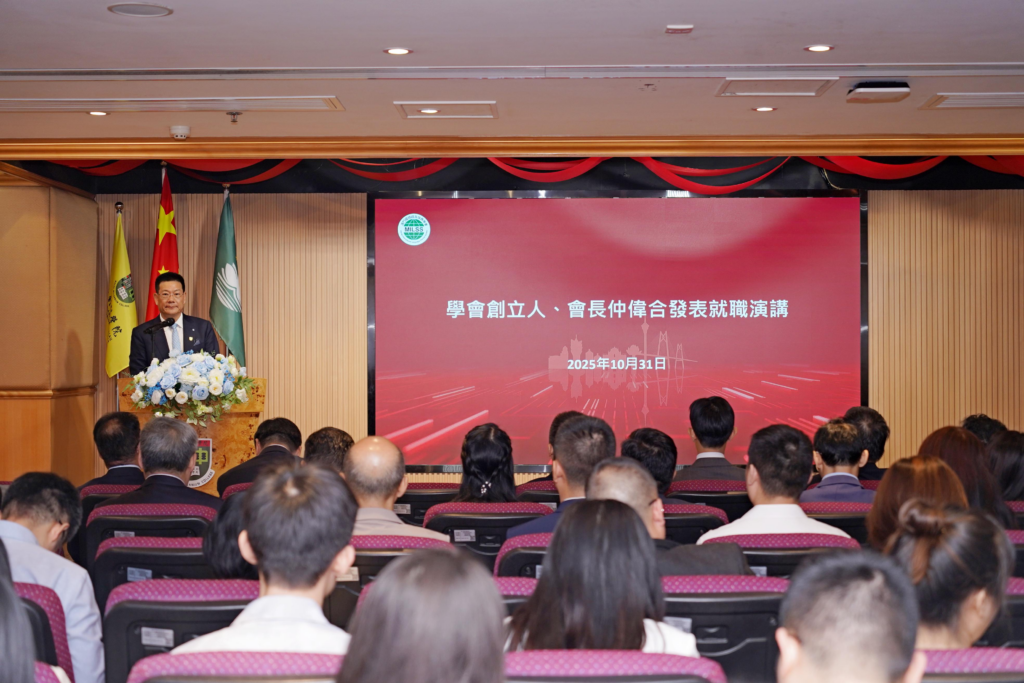
Zhong Weihe stated that the Society will rely on its charter to build an open, democratic, co-built, and shared operational mechanism, focusing on such five main tasks as technological innovation, decision-making consultation, international cooperation, standard-setting, and cultural dissemination, to promote the professionalisation and standardisation of language services. Furthermore, the Society will focus on innovations in “Portuguese+Digital Technology”, “Language Services+Cultural Communication”, and “Data Empowerment+Standard Leadership”, to create a multilingual intelligent laboratory and industry standard system, building platforms for international cooperation and cultural exchange, and striving to build Macao into an international language services hub serving the Greater Bay Area, Portuguese-speaking countries, and the Belt and Road Initiative.
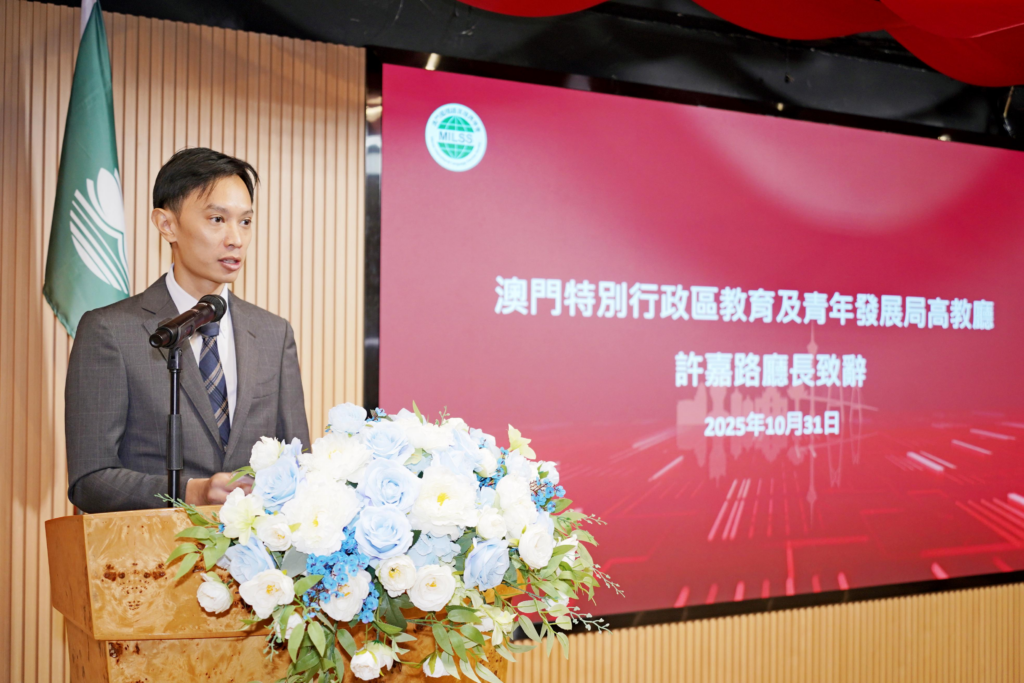
In his speech, Carlos Roberto Xavier, Head of the Department of Tertiary Education of the Education and Youth Development Bureau of the Macao SAR Government, stated that to implement President Xi Jinping’s vision of building a strong nation in education, science and technology, and talent, the Macao SAR Government is focused on expanding its educational cooperation network, strengthening Macao’s role as a world centre of tourism and leisure and a commercial and trade cooperation service platform between China and Portuguese-speaking countries, optimising governance structures in higher education, improving academic discipline layouts, and cultivating diverse talents. Language is not only a carrier of civilisation, but also an important component of new quality productive forces. The establishment of the Society will build a collaborative innovation mechanism integrating academic research, industry practice, and talent cultivation, leveraging Macao’s unique role as the bridge between China and Portuguese-speaking countries. It will help Macao to become the language services hub of the Greater Bay Area, and enhance local influence in global language technology and cultural exchange. The Education and Youth Development Bureau will continue to support the deepening of collaboration between higher education institutions and industries, promote the integration of education, technology, and talent development, and contribute to Macao’s development into a high-end talent hub, injecting continuous momentum into high-quality development in both Macao and the Greater Bay Area.
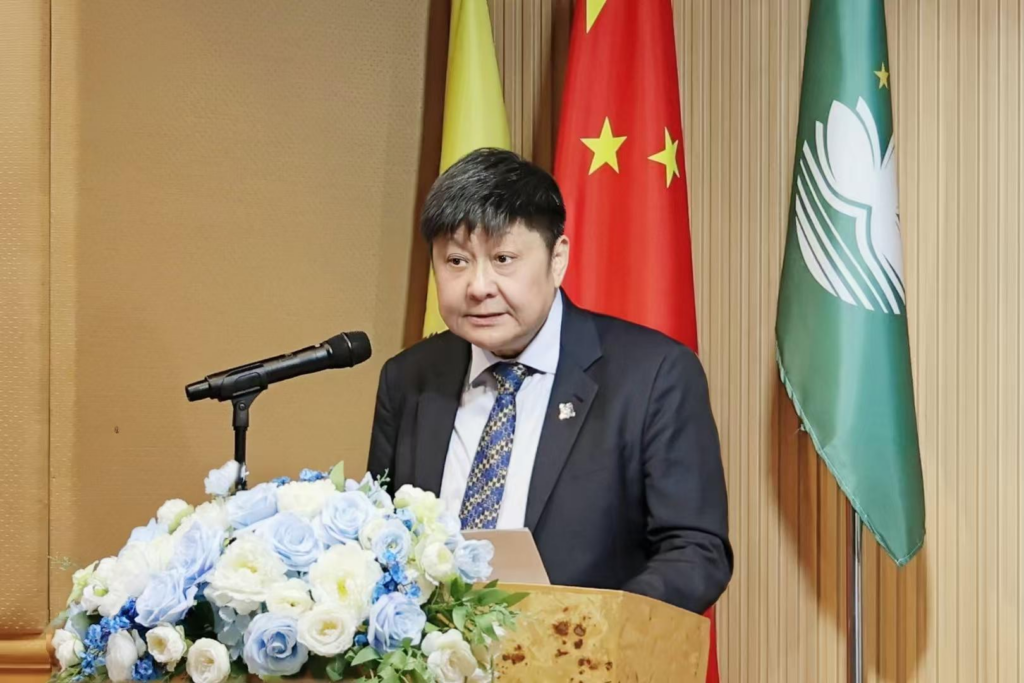
Professor Zhang Hongming, Dean of the International College of Macau University of Science and Technology, noted in his congratulatory speech that the establishment of the Society comes at an opportune time, shouldering the key mission to drive innovation in language technology applications, policy research, and international cooperation. He expressed the hope the Society will actively embrace digital intelligence, lead innovation in language technology, strengthen policy guidance and standard construction, deepen global cooperation, build a Chinese-Portuguese and Belt and Road language services alliance, focus on local industries, promote the integration of language services with a diversified economy, innovate talent cultivation models, achieve industry-education integration, empower culture with technology, tell China’s story well, and focus on key projects to form a demonstration effect.
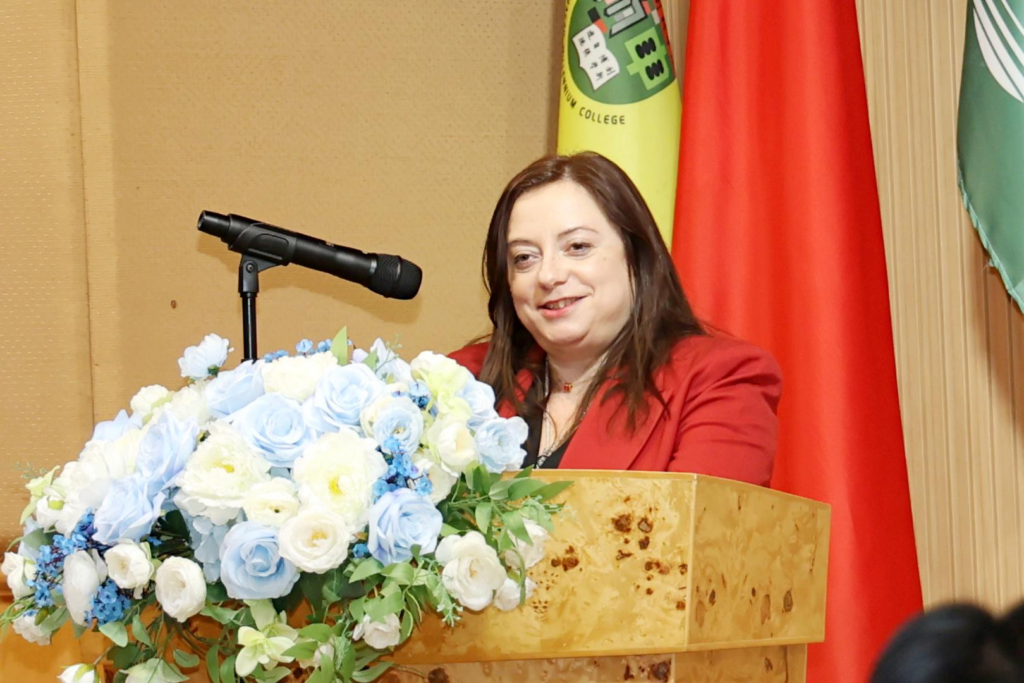
Esterina Nervino, Assistant Professor and Co-director of the New Frontiers in Professional Communication Lab at City University of Hong Kong, stated in her congratulatory speech that the establishment of the Society marks an important step forward in Macao’s integration of language services and technology. With the deep application of AI and data technologies, language services are becoming an important infrastructure for global digital economy and international exchange. The Society will bring together the wisdom of academia and industry to drive breakthroughs in language technology innovation and application, providing new momentum for the development of language services in Macao and the Greater Bay Area.
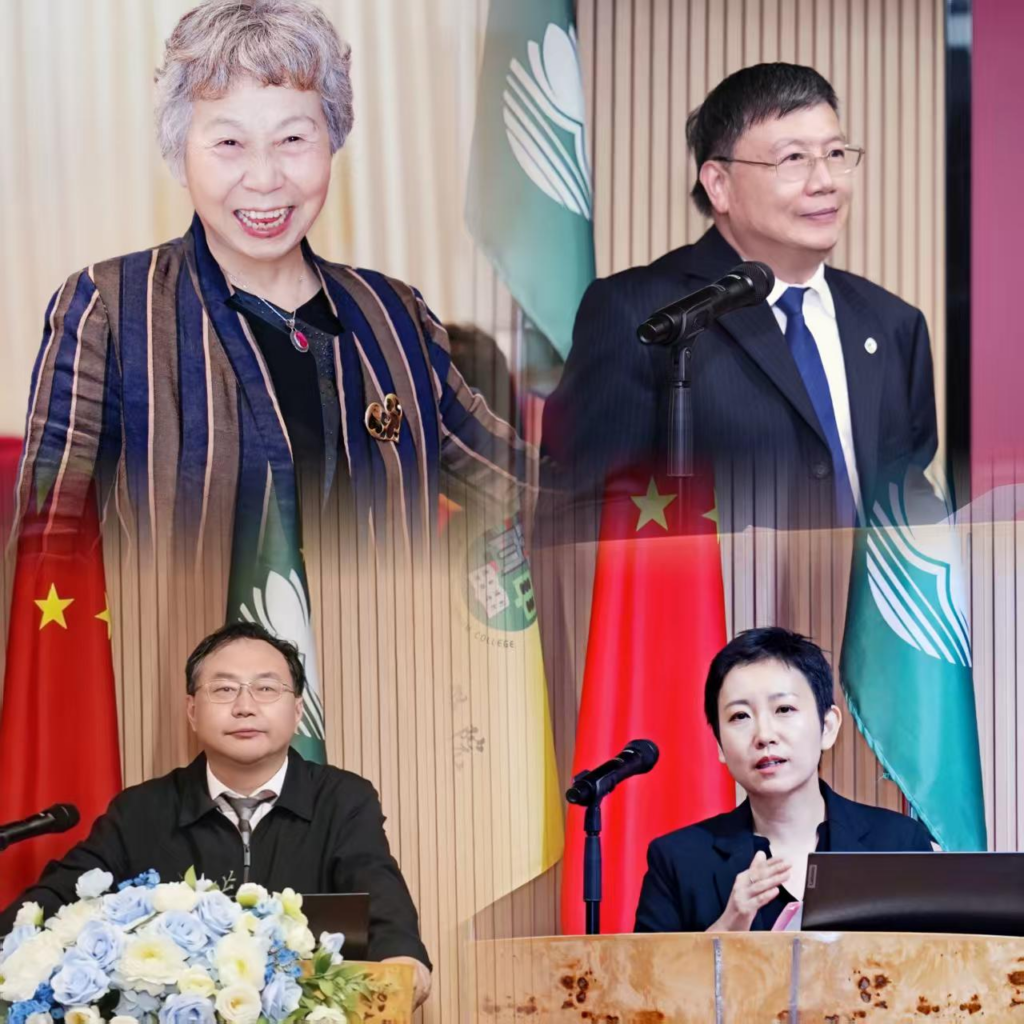
The keynote speech session was chaired by Liu Heping, former Dean of the Graduate School of Translation and Interpretation at Beijing Language and Culture University, Xu Jie, Dean of the Faculty of Arts and Humanities at the University of Macau, Huang Guowen, Associate Dean of the Faculty of Humanities and Social Sciences at City University of Macau, and Wang Weiwei, Associate Dean of the School of Interpreting & Translation Studies at Guangdong University of Foreign Studies.
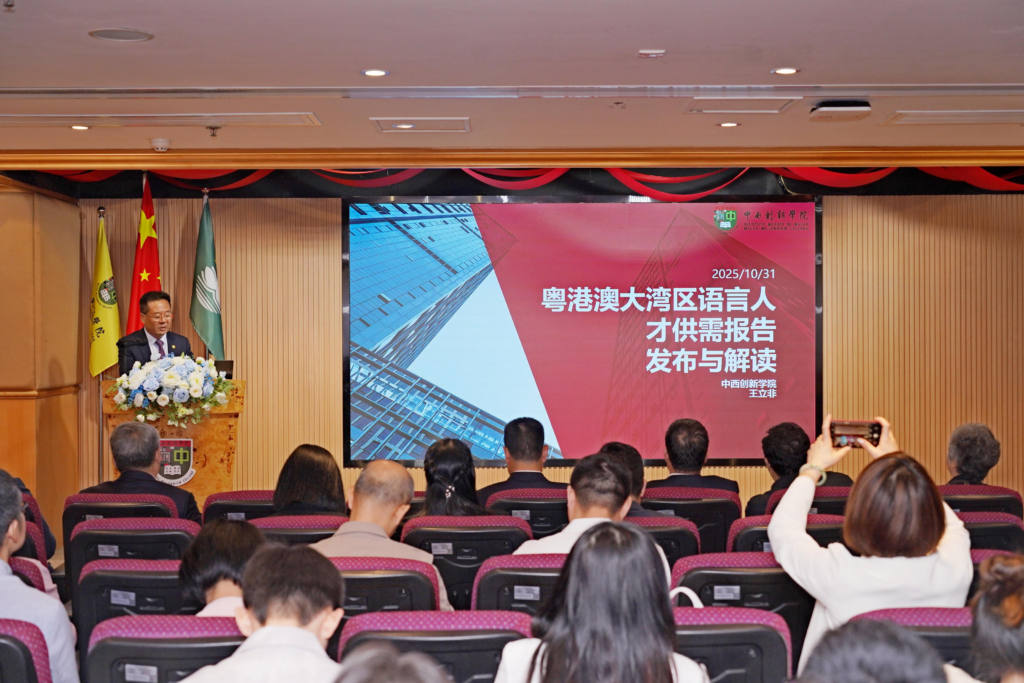
Wang Lifei, Distinguished Professor at MMC and Chair of the Board of Directors of the Society, released and interpreted the Big Data Report on Talent Supply and Demand for Language-Intensive Positions in the Guangdong-Hong Kong-Macao Greater Bay Area. The report, based on the three major national strategies of Digital China, Healthy China, and the Belt and Road Initiative, systematically analyses the current structure and future trends of language talent in the Greater Bay Area. Research shows that language services are becoming an important infrastructure supporting the digital economy, cross-border trade, and intelligent healthcare. The report, for the first time, clearly identifies three core types of language talent—language technology professionals, language healthcare specialists, and Belt and Road multilingual experts—corresponding to the strategic needs in AI and big data applications, language rehabilitation and special education services, and multilingual international cooperation. According to an analysis of recruitment big data from January to August 2025, Belt and Road language positions accounted for the largest share at 71.7%, followed by language technology roles at 26.3%. Although language healthcare positions accounted for only 2%, they showed the fastest growth rate. The report predicts that by 2030, the total demand for language talent in the Greater Bay Area will reach 450,000, with the demand for language technology professionals growing at an annual rate of 24.6% and for language healthcare specialists growing by 38%. Currently, 70 universities in the Greater Bay Area offer foreign language or translation programmes, covering 26 languages, but there is still a structural gap between these programmes and the needs of emerging industries. The report proposes four key action directions. First, advance the development of master’s and doctoral programmes and practice bases for “Digital and Intelligent Language Services”; second, co-build a Guangdong-Hong Kong-Macao language services platform and promote resource sharing; third, establish a language technology innovation fund to advance “AI + Language Rehabilitation” applications; fourth, create a language services hub in the Free Trade Zone to fully support high-quality language talent cultivation and industry development by 2030.
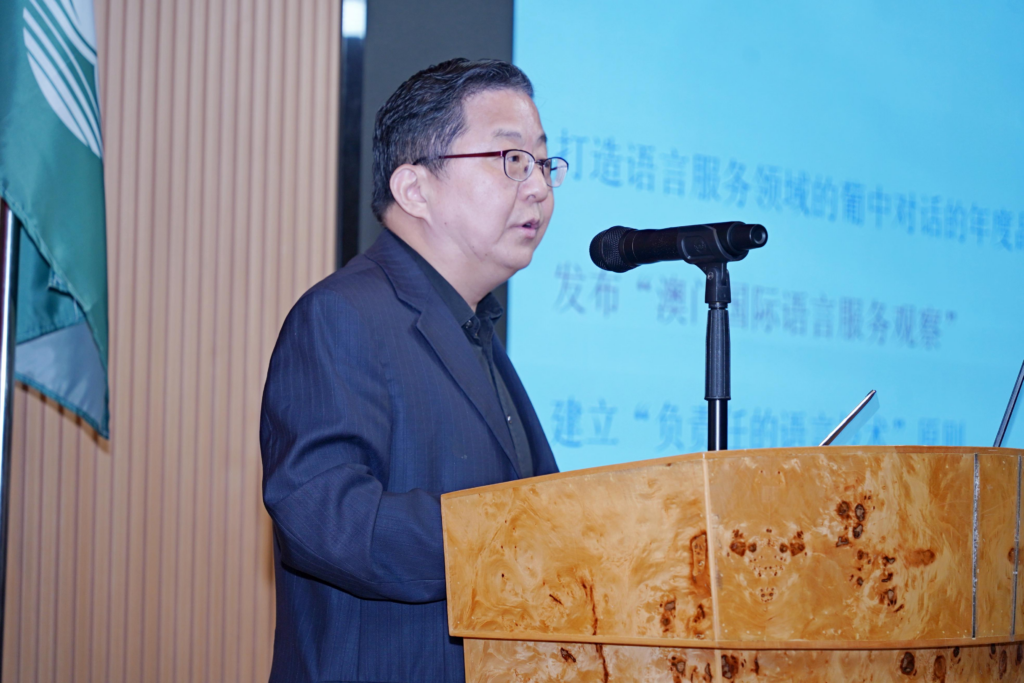
Professor Guo Yingjian, Director of the National Reading Education Research Institute at Renmin University of China, pointed out in his keynote speech, Turning Language into Productive Force: New Paths for Foreign Language Disciplines to Connect with International Language Services, that language is moving from an academic discipline to a national necessity, from a role in translation that can be replaced to one of human-machine collaboration, and from a cost centre to a source of productive force. Only by integrating language into a systematic framework can it truly become a source of productivity. He proposed the standardised, scenario-based, and ecological transformation path for foreign language disciplines, advocating for the formation of shared abilities through a common language, driving innovation through key scenarios, and ensuring sustainable development through collaborative mechanisms.
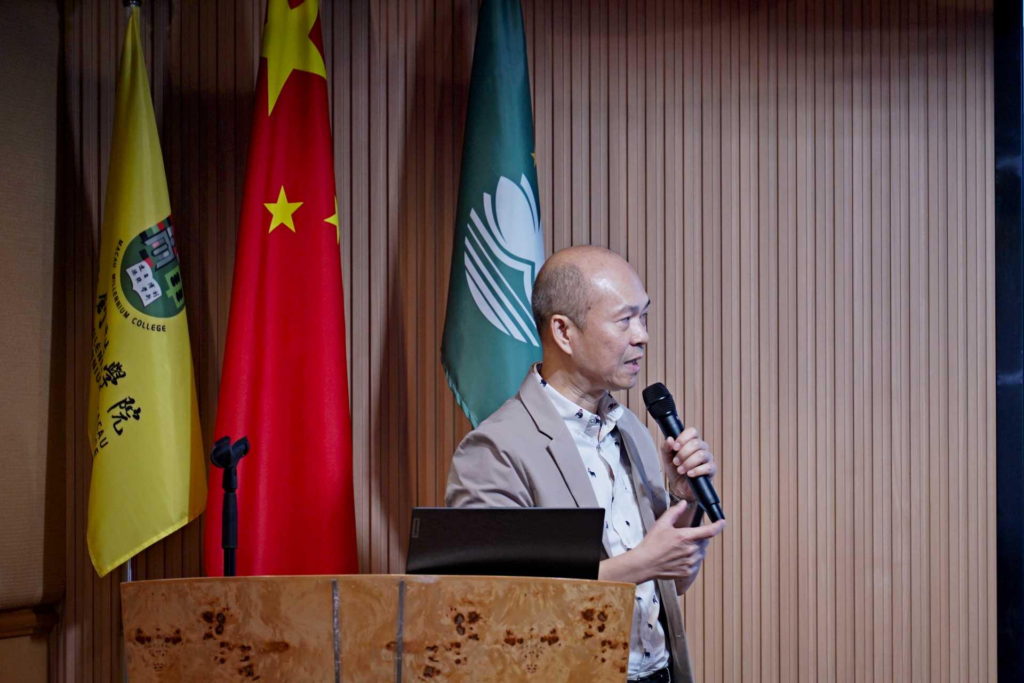
Wong Fai, professor in the Department of Computer and Information Science in the Faculty of Science and Technology and leader of the Natural Language Processing & Portuguese-Chinese Machine Translation Laboratory, reviewed the development history of machine translation from the Georgetown-IBM experiment in 1954 to the current neural machine translation driven by large models in his keynote speech, From Words to Worlds: The Journey of Language Technologies in Shaping AI, pointing out that machine translation is moving from “word alignment” to “knowledge modeling” and “cross-lingual understanding”. He stated that in the era of large language models (LLM), language is no longer just symbol conversion but the reconstruction of world knowledge and cultural context. Based on the research his team published in ACL 2024, he demonstrated how the “prefix text induction method” improves cross-lingual alignment and generation effects of large models, proving that unsupervised fine-tuned models also have multilingual potential. He emphasised that future machine translation should achieve the integration of faithfulness, expressiveness, elegance, and cultural perception, making translation a true wisdom bridge connecting different civilisations.
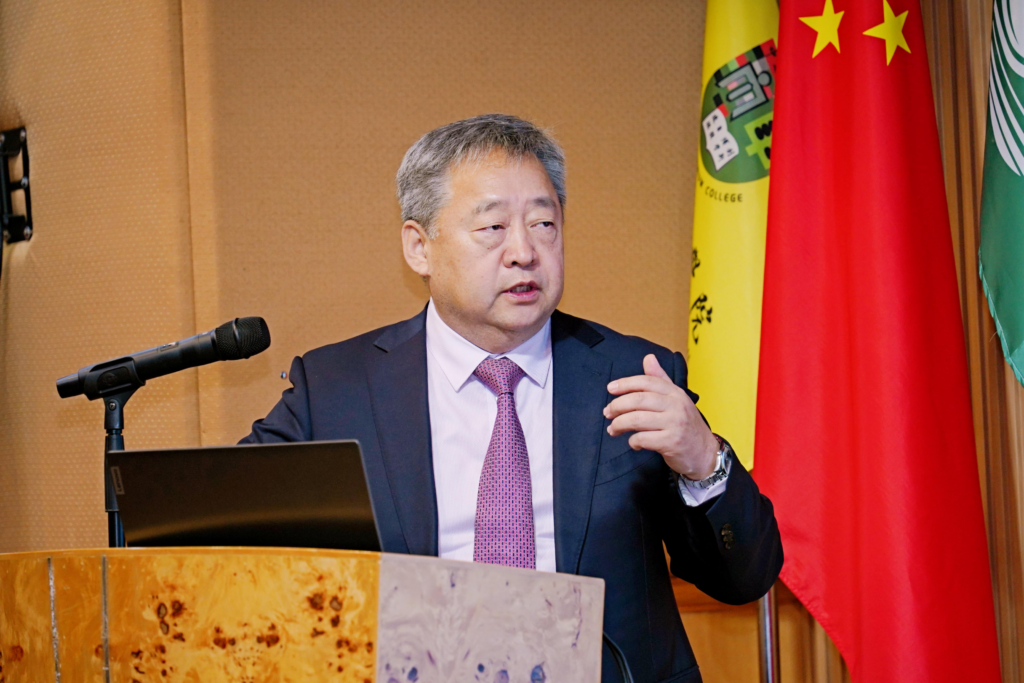
Professor Wang Lidi, from the School of Humanities and Social Sciences at The Chinese University of Hong Kong Shenzhen, pointed out in his keynote speech, From Policy to Practice: LSPs’ Organisational AI Strategies and Translator Engagement, that AI is profoundly changing the organisational culture and production processes of language service providers, but there is a gap between AI strategic deployment by management and the practical application experience of translators, and that translators generally face issues such as insufficient training, high technical barriers, and low involvement in decision-making. He suggested that language service organisations should establish an integration mechanism between top-down strategic drive and bottom-up translator innovation, improve the feedback loop, and achieve collaborative development between organisations and practitioners. He also called on the industry to strengthen risk governance, data security, and ethical review while advancing AI applications, and to cultivate AI literacy and autonomous learning abilities in translation education, in order to promote the high-quality, intelligent transformation of the language services industry.
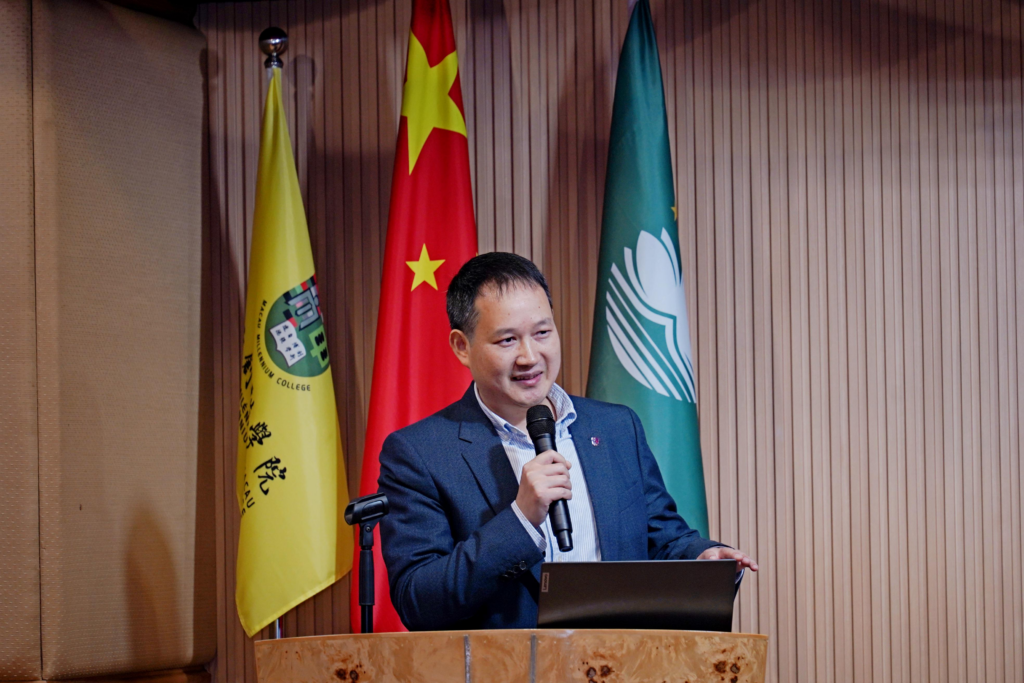
Professor Zheng Binghan, Director of the Centre for Intercultural Mediation and Associate Professor of Translation Studies at the School of Modern Languages and Cultures, Durham University, delivered a keynote speech titled Cognitive Interpretation Research Empowered by Artificial Intelligence: Paradigm Shift and Future Outlook, in which he reviewed the development of interpretation technology from “machine-assisted” to “AI-enhanced” and pointed out that AI technology, with automatic speech recognition, large language models, and human-computer interaction at its core, is reshaping interpreters’ work patterns and cognitive structures. He emphasised that the intervention of AI requires interpreters to reallocate attention and cognitive resources when processing multisensory information, which may lead to cross-modal interference. He proposed that future cognitive interpretation research should establish a theoretical framework integrating multisensory processing, dynamic regulation, and emotional resilience, using eye-tracking, EEG, and corpus behaviour data for multidimensional research, and explore the cognitive adaptation mechanisms and strategic evolution of human-computer collaborative interpretation. He believed that interpretation research would shift from focusing on translation accuracy to pursuing cognitive collaborative efficiency, promoting the deep integration of AI and human intelligence in the language services field.
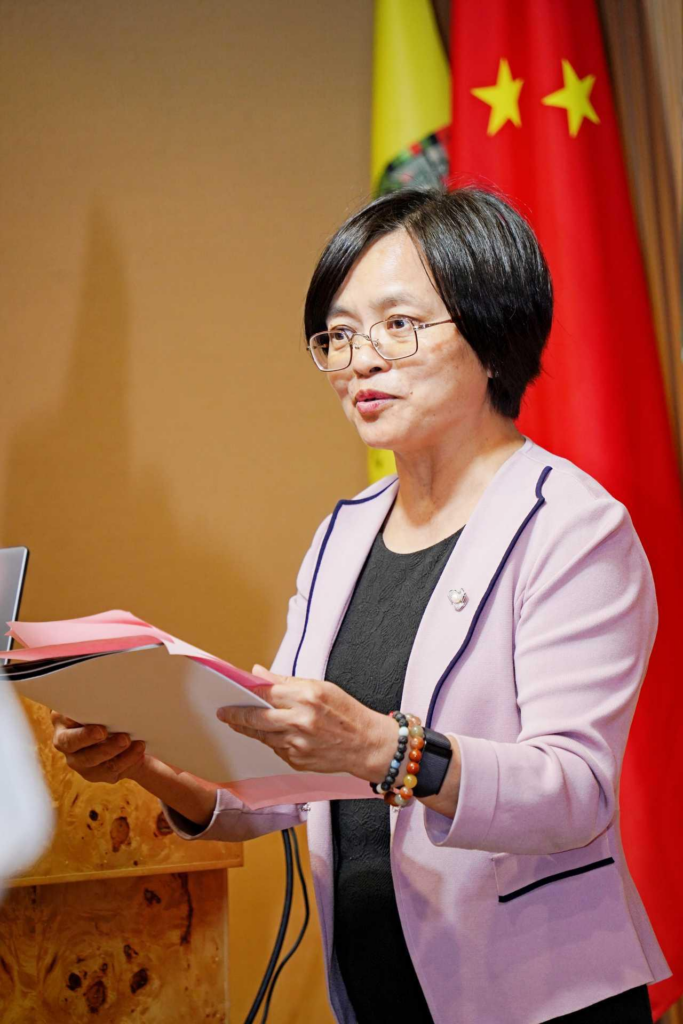
The thematic report session was chaired by Professor Zhong Ling, Dean of the School of Foreign Languages at Shenzhen Technology University.
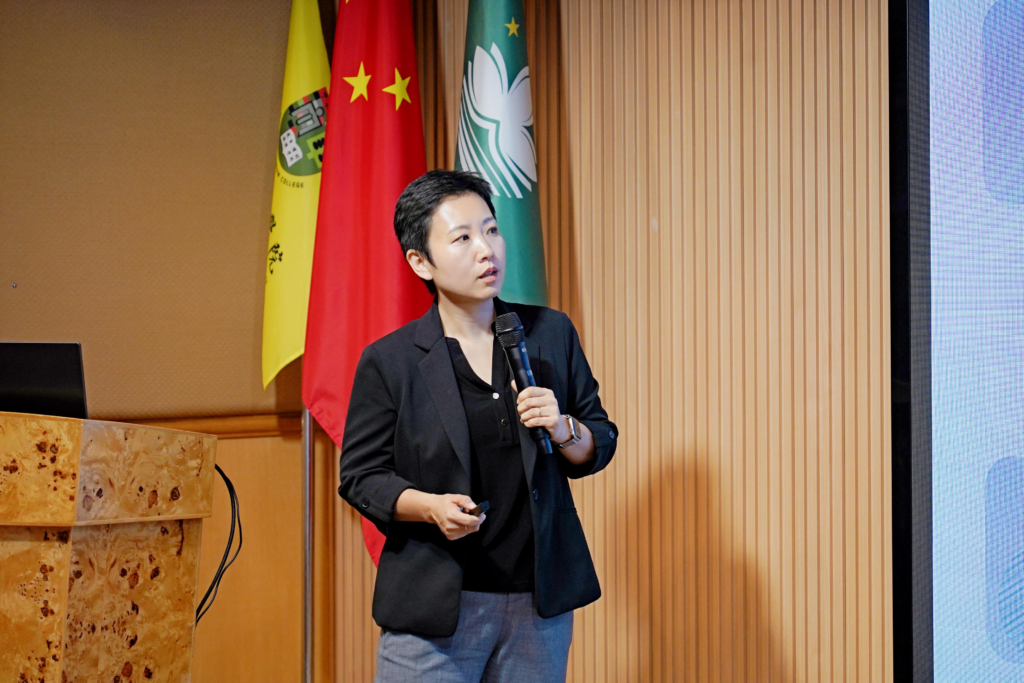
Professor Wang Weiwei, Associate Dean of the School of Interpreting & Translation Studies at Guangdong University of Foreign Studies, gave a keynote speech titled Demand-driven Development and Innovation Pathways of Doctoral Translation Programmes, elaborating on the mission upgrade of translation education in serving national strategies and industrial transformation in the new era. She pointed out that with the introduction of the Doctor of Translation and Interpreting (DTI) degree in the Directory of Graduate Education Disciplines and Programmes (2022), translation education is entering a new stage focused on building national discourse systems and enhancing international communication capabilities. The DTI programme at Guangdong University of Foreign Studies follows the principles of demand-driven, practice-oriented, and collaborative education, restructuring the doctoral education model and emphasising demand, practice, intersection, innovation, internationalisation, and core competencies. The DTI programme integrates AI, big data, and corpus technology into teaching through a tripartite collaborative mechanism involving universities, industries, and government, aiming to cultivate high-level translation leaders with technical, management, and innovative capabilities.
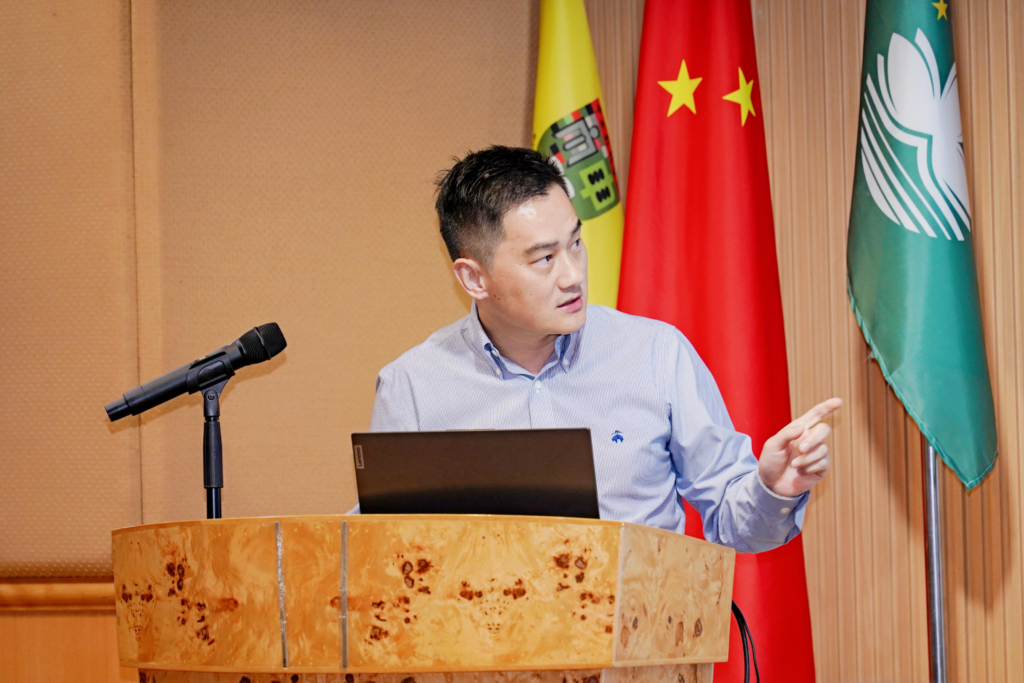
Huan Changpeng, Associate Professor in the Department of English at the Faculty of Arts and Humanities, University of Macau, delivered a report titled Corpus-driven Critical Imagology: Empowering International Language Services and National Image Communication, proposing a new paradigm of critical imagology that integrates corpus linguistics and critical discourse analysis and exploring the relationship between language, power, and national image construction. He pointed out the symbolic biases and psychological predispositions of Western media toward China’s image and introduced the “Three Realms Model” (symbolic world, psychological world, and real world) and the “3V Model” (Visibility, Value, and Voice), explaining the cyclical construction mechanism of national image in discourse space, and that the integration of corpora and AI is driving the transformation of language services from content production to cognitive management, shifting from passive execution to strategic empowerment. He suggested establishing a negative framework identification mechanism, constructing a cross-cultural metaphor strategy database, and developing a corpus-based public opinion early warning system to enhance the global visibility and influence of Chinese discourse.
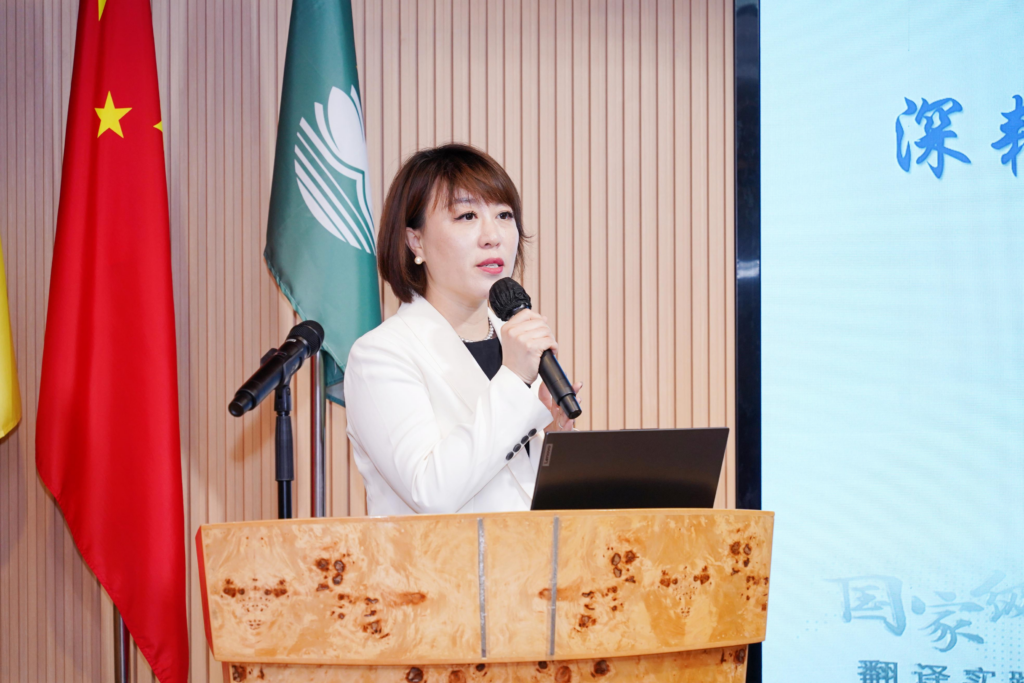
Professor Zhao Yihui, Associate Dean of the School of Translation Studies, Xi’an International Studies University, gave a keynote talk titled Deepening Language Services, Connecting Silk Road Development—The Mission and Innovation of Xi’an Foreign Language University in Language Service Talent Cultivation. She pointed out that, as one of the first four foreign language institutions established in New China, Xi’an International Studies University has long served national strategies and international exchange with its multilingual advantages, playing an important role in the Belt and Road Initiative. The University promotes deep integration of translation education with AI, cultural communication, legal services, and other fields through its “One Body, Two Wings, Three Wheels Drive, Multi-party Collaboration” talent cultivation model. The University will rely on the Collaborative Innovation Centre for the Silk Road Language Services and the Multilingual Intelligent Translation Platform to promote corpus co-construction, intelligent language services, and customised large model applications, contributing more the University’s power to the Belt and Road Initiative and the internationalisation of the national discourse system.
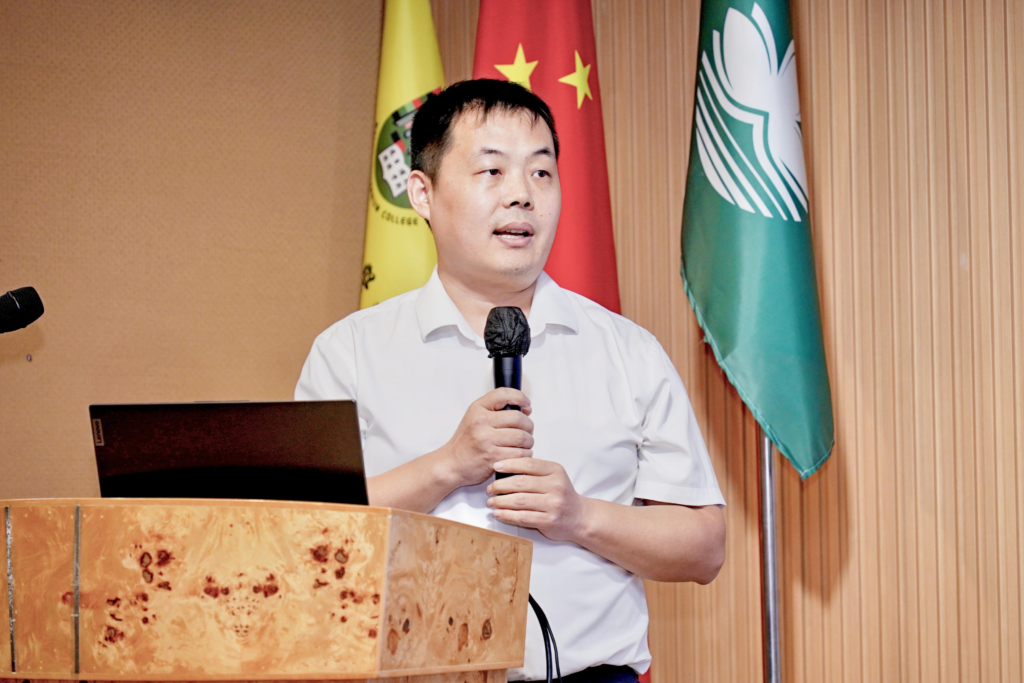
Tian Liang, Chairman of New Tranx Information Technology (Shenzhen) Co., Ltd., delivered a keynote report titled Development of the Digital and Intelligent Language Services Industry in the Greater Bay Area—Industry Ecosystem Construction and Global Element AI Platform, explaining the intelligent transformation path of the language services industry from the perspectives of data elements, algorithm computing power, and industrial ecosystem, and proposed the construction of a global element AI platform with a database of patents, literature, enterprises, and talent, aiming to achieve intelligent matching and value feedback through self-developed algorithms and industry models and create an intelligent ecosystem that covers industry monitoring, technology discovery, and talent scouting. Tian Liang emphasised that the core competitiveness of language services is shifting from translation efficiency to knowledge productivity, achieving a full-chain upgrade from content production to decision support through the “Five Transformations and One Integration” approach (i.e., Accuracy, Immediacy, Professionalism, Process Optimisation, and Intelligence).
In the afternoon, the guests visited the Taipa campus of MMC to learn more about the college’s smart campus construction and digital and intelligent language service teaching and research facilities.
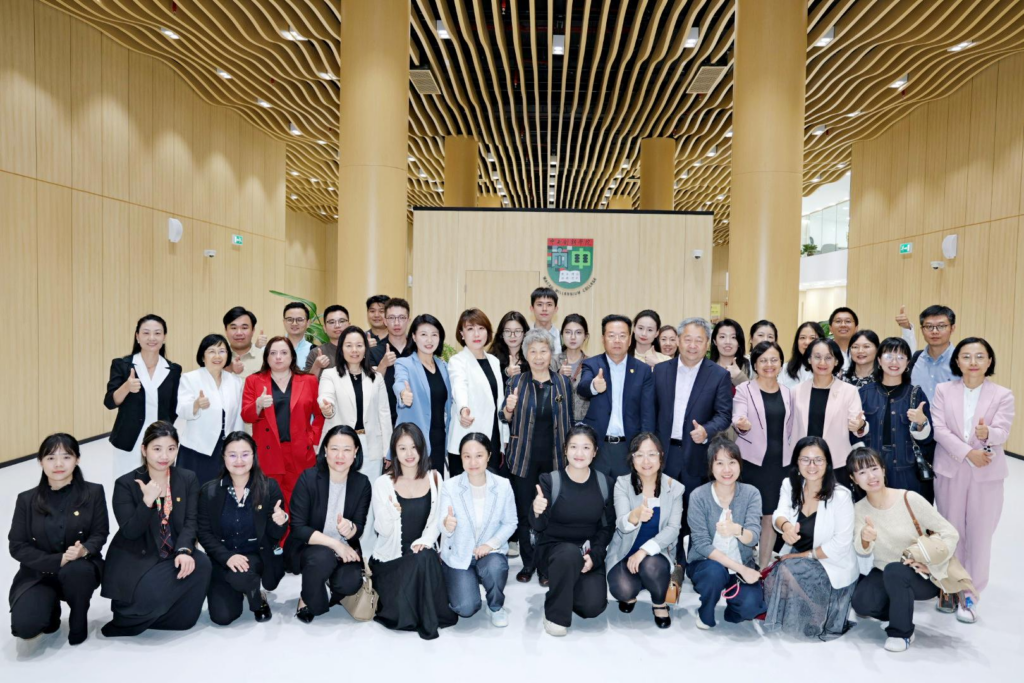
The Society was officially approved by the Macao SAR Government in August 2025, becoming the city’s first international platform focused on language services research and development. Guide by the mission of “connecting the Greater Bay Area, the Chinese mainland, and the world”, the Society aims to promote the integration of language services in the Greater Bay Area, build an open cooperation platform that combines academic research, technological innovation, and industrial applications, and explore deep integration between language education, AI, and national strategic needs.
The successful hosting of this event marks the official launch of the Society. In the future, the Society will actively participate in international standard setting, promote regional policy coordination, and foster the integration of academia and industry, helping Macao to become an international multilingual service hub serving the Greater Bay Area, Portuguese-speaking countries, and the Belt and Road Initiative and contribute its wisdom and solutions in the wave of digital intelligence and global changes.
Organisational Structure of Macao International Language Service Society
- Honourary Presidents (3)
Huang Guowen (City University of Macau), Zhang Hongming (Macau University of Science and Technology), Xu Jie (University of Macau)
- Presidium of the General Assembly (3)
President: Zhong Weihe (MMC)
Vice Presidents: Zhang Yunfeng (Macao Polytechnic University), Zhu Xianchao (Lan-bridge, Sichuan)
III. Board of Directors (9)
Chair: Wang Lifei (MMC)
Vice Chairs: Li Li (Macao Polytechnic University) (Chair of the Academic Division), Meng Yongye (Foryou, Beijing) (Chair of the Enterprise Division)
Board members: Zhong Weihe (MMC), Gao Ming (Boss Translation, Macao), Tian Liang (New Tranx, Shenzhen), He Enpei (Transn, Wuhan), Xiao Pengcheng (Octopus Times)
Secretary-General: Yang Yanchao (MMC)
- Board of Supervisors (3)
Chair: Li Defeng (University of Macau)
Vice Chairs: Chen Yujie (Macau University of Science and Technology), Yang Ruifeng (Taya, Beijing)

